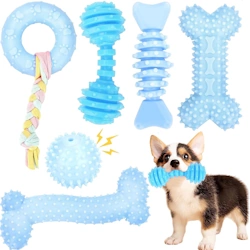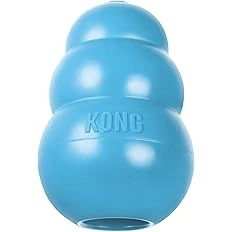How to Stop Puppy Biting: Tips for Your Little Shark
Are you trying to stop puppy biting, but finding yourself on the receiving end of tiny sharp teeth? Don’t worry - you’re not alone!
Almost every puppy goes through a biting phase, and though it may feel like a tiny shark attack, it’s completely normal. Don’t panic, your little one just needs a some guidance and patience.
With some consistent training, this behavior will soon be a thing of the past!
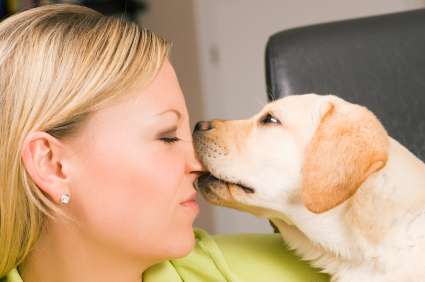
When you first bring a puppy home, your initial objective will be to make him comfortable and unafraid in his new home and with his new family pack.
Enjoy him and give him a little slack for a few days, but don't delay important training too long.
Understand Why Puppies Bite (Spoiler: It’s Not Personal)
Before you get upset, remember that puppy biting is a natural behavior. It’s a part of their teething process, a way to explore their world, and even a form of play.
Think of it like this: your puppy’s teeth are like tiny, sharp little tools for figuring out everything in his surroundings. But here's the good news—they don’t need to bite you to learn.
Why it happens:
- Teething: Just like human babies, puppies go through teething and want to chew on things to relieve discomfort.
- Playfulness: Puppies also explore their surroundings with their mouths. Your hands, feet, and furniture? All fair game for these little adventurers.
- Attention Seeking: Sometimes, puppies bite to get your attention—because, let’s face it, it usually works!
So, when they bite, remember: it’s not a personal attack. They just want
to explore, and your fingers are very interesting to them.
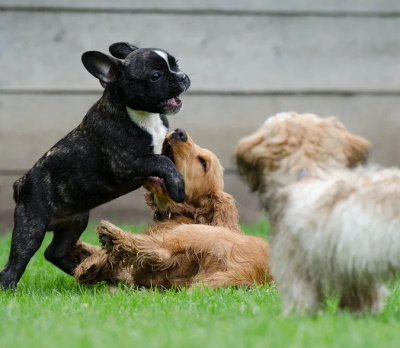
Teach Bite Inhibition (The ‘No Biting’ Rule)
Okay, now we need to teach your puppy that your hands are off-limits. And don’t worry, this isn’t as complicated as it sounds!
Here’s a simple technique called bite inhibition that works wonders.
Here’s how to do it:
- When your puppy bites too hard (even if it’s playful), yelp like you’re a squeaky toy. This mimics how puppies communicate with each other when they get too rough during play. It’s like saying, "Hey, that hurt!"
- After the yelp, immediately stop playing and turn away for a few seconds. Puppies don’t like to be ignored, so this will teach them that biting leads to no fun.
- You can also replace your hand with a chew toy to redirect their biting. Make sure the toy is something they really enjoy. That way, they’ll start to associate biting with the toy, not you.
Tip: Practice this consistently, and soon your puppy will get the hint that biting doesn’t get them anywhere exciting!
Redirect to Chew Toys
When your puppy starts nibbling on you, don’t just pull away (it’ll feel like a game of tug-of-war, trust me). Instead, offer them a chew toy to redirect that energy. Puppies love to chew, especially when they’re teething.
Try this:
- Frozen chew toys or frozen carrots can be soothing for teething puppies and will keep them busy for a while.
- Make sure you have a variety of chew toys, like rubber toys, rope toys, or even a Kong filled with peanut butter. The more exciting the toy, the less appealing your hands will be!
Avoid Using Your Hands to Play Rough
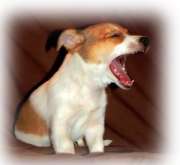
It can be tempting to engage in playful wrestling with your puppy, especially when they seem so full of energy.
But using your hands to wrestle can encourage biting. Instead, use toys to interact and play, and avoid moving your hands near their mouth.
Pro Tip: Playful biting is not a "no" because there will be times you play with your pup using your hands.
There's a subtle difference between playful and when your puppy starts to chew on your fingers or clothes aggressively. Then, replace it with a toy they can sink their teeth into. Consistency is key!
When All Else Fails: Time-Outs
Sometimes puppies get so worked up that they need a little timeout to cool off. This doesn’t mean sending them to their room (we’re not punishing them here!), but simply giving them a brief pause from play.
Here’s how to do it:
- If your puppy gets too bitey during play, gently walk them to a quiet area and give them a minute to chill out. The goal isn’t to make them feel bad, but to show them that biting ends playtime.
- You can also use this as an opportunity to give your puppy a bit of alone time in their crate or pen.
Be Consistent and Patient
(Rome Wasn’t Built in a Day)
Remember, this is a phase, and like any phase (hello, the terrible twos), it takes time to get through it. Your puppy will not magically stop biting overnight. But with consistent, gentle redirection and a lot of patience, they’ll eventually learn.
Puppies are like little sponges, soaking up everything they can. If you stay consistent with your training, your puppy will understand what’s appropriate to bite (like toys) and what’s not (like your fingers or ankles).
Now, I’m not going to lie—it takes repetition, consistency, and a whole lot of patience (and maybe some extra band-aids). Your puppy won’t magically stop biting overnight.
But trust me, every time you redirect them to toys or use the ‘ouch!’ technique, you’re getting closer to that peaceful, bite-free future you’ve been dreaming of!
Stop Puppy Biting - Common Mistakes
Even experienced dog owners make these mistakes, so don’t feel bad if you catch yourself doing them!
Mistake #1: Using your hands to wrestle or play too roughly
Solution: Always use toys for play, not your hands or feet.
Mistake #2: Scolding your puppy too harshly
Solution: Stay calm and use positive reinforcement—yelling or hitting is counterproductive.
Mistake #3: Stopping training too soon
Solution: Keep practicing. Repetition is the key to success here!
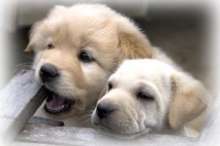
Training Tips To Stop Puppy Biting
A puppy that is allowed mouthing, chewing, or nipping at your hands, arms, or clothing is going to think he is dominant and you will have difficulty obedience training him thereafter.
This needs to be reversed by a clear message to your puppy that this behavior is unacceptable.
- Become your dog's pack leader, learn how to do this effectively here.
- Never play aggressive games, chasing games or tug of war games with your puppy while you are training to stop puppy biting and nipping. While they love these type of games, to a young puppy they are very stimulating and an open invitation to biting and nipping.
- Always be in charge of playtime, when it starts and when it stops. This shows that you are in the alpha or pack leader position with your pup.
- Everyone in the family must be communicating in the same way and must not deviate from the strategies you are using.
- Stick with your training plan until reliable behavior is established.
Final Thoughts: It Gets Better!
In the end, to stop puppy biting takes a little time and is just one of those things you have to get through. The good news? It doesn’t last forever.
With some dedication and love, your little shark will soon be giving you sweet puppy kisses instead of using you as a chew toy. 🦈❤️
And remember, you’ve got this! Your puppy just needs a little guidance and a lot of patience. Soon, they’ll be too busy chewing on their toys to even think about nipping at you. Hang in there!
By making these small adjustments and being consistent, you’ll have a puppy who understands that biting isn’t the way to play.
Stick with it, and soon enough, your little ball of fluff will be the best-behaved pup in town.
Kong Puppy Teething Chew Toy
Can be filled with treats like peanut butter.
Easy For Puppy To Chew
Before You Go...
If you like the content of this page, as well as others on my site, please give it some love by clicking on the heart in the lower right hand corner. This helps me keep providing enjoyable and useful content.
Thank you.
Other Training Topics
- Home ›
- Dog Training ›
- Stop Puppy Biting

